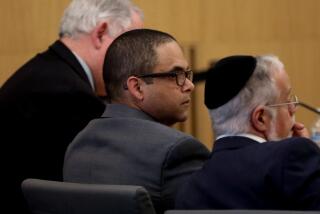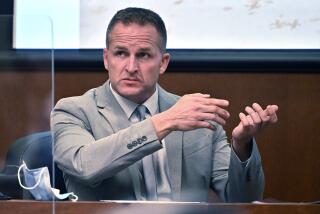Miami on Edge as Ex-Policeman’s Retrial to Begin : Courts: Jury in Orlando will decide if Lozano is guilty of manslaughter. Fears persist that an innocent verdict could touch off new riots.
- Share via
MIAMI — After months of delay and legal wrangling, the controversial manslaughter retrial of a former Miami police officer charged with killing two black men is about to begin--not here but 230 miles away in Orlando.
The people of Miami, however, will be holding their breath.
“My hopes are that justice will reign, and Mr. (William) Lozano will be punished for his crimes,” said Ray Fauntroy, president of the Southern Christian Leadership Conference’s Miami chapter. The trial is set to begin Monday.
“My fear, of course, is that he will be acquitted and the people will feel a sense of injustice, a sense of no value, no worth and respond in the only way they have been allowed to respond--through violence.”
The Lozano case is to Miami what the Rodney G. King case was to Los Angeles: charged with racial issues, fraught with emotion, a test for the criminal justice system, compelling and explosive.
The stakes are high. Over the last 15 years there have been several high-profile slayings or beatings of blacks by white police officers in greater Miami and almost no successful prosecutions. Lozano, who is Latino, once was convicted of manslaughter but his conviction was overturned.
“There is broad skepticism among blacks about this trial,” said Marvin Dunn, a sociologist who has written extensively about Miami’s racial tensions. “It is being watched with a jaundiced eye.”
Lozano--born in Colombia and now 33 years old--was on routine patrol in January, 1989, when he fired his service revolver at an oncoming motorcycle in the Overtown section of Miami. Two black men died and, for the fourth time in a decade, the city erupted in flames as people took to the streets to protest what many saw as a summary execution.
In three nights of arson, looting and rioting, dozens of inner-city Miami homes and businesses were destroyed and this city’s reputation for ethnic divisiveness and spontaneous violence grew apace.
Unlike the King case, there is no videotape of what happened the night of the shooting. But there is plenty of testimony.
During his first trial in December, 1989, Lozano said that he fired a single shot from his 9-millimeter pistol because he thought he was going to be run over and he feared for his life.
But prosecution witnesses said that Lozano stepped into the street to draw a bead on the motorcycle. He killed the driver, Clement Lloyd, 23, with a shot in the head. Lloyd’s passenger, Allan Blanchard, 24, died the next day of injuries suffered when the motorcycle careened into a car.
Lozano subsequently was found guilty of two counts of manslaughter, stripped of his badge and sentenced to seven years in prison. Miami remained calm.
But in June, 1991, a three-judge appeals court panel agreed with Lozano’s contention that he did not receive a fair trial because Miami jurors feared an acquittal would lead to more rioting. A new trial was ordered.
Finding a site for the retrial turned into a game of hot potato. In April, 1992, Dade County Judge W. Thomas Spencer ruled that the trial would take place in Orlando, a city with a black population of 10%. But weeks later in the aftermath of the King case and the Los Angeles riots, which Spencer called a “national tragedy,” the judge abruptly changed his mind and ordered the case to Tallahassee, the state capital, where the 20% black population approximates Miami’s racial makeup.
That decision--which Spencer made without benefit of hearings--touched off a firestorm of objections. Tallahassee did not want the case. Roy E. Black, Lozano’s defense attorney, asked the appeals court to remove Spencer from the case on grounds that he was unduly influenced by the news media and public opinion. The prosecutor joined in the motion.
Last July, the chief judge in the circuit that includes Tallahassee remanded the trial back to Orlando. But in November, the Florida Supreme Court sent it back to Tallahassee.
On March 8, two days before the trial was to get under way, Assistant State Atty. John Hogan shocked the judge by suddenly declaring that he thought a conviction would be easily reversed on grounds that a Tallahassee jury is unlikely to include any Latinos, Lozano’s peer group.
The next day a state appeals court stepped in, canceling jury selection, postponing the trial indefinitely and giving Spencer time to think again. He sent the case back to Orlando.
Only Lozano and defense attorney Black are pleased that the case will be tried there. Although the jury pool is likely to include few Latinos, it is sure to include even fewer blacks. Prosecutor Hogan, and most of the black community, think that the trial should be returned to Miami.
“Orlando? You might as well put the trial in China,” said Gregory A. Samms, president of the Black Lawyers Assn. in Miami.
“You have to start with the premise that racism and discrimination exist in the criminal justice system. It’s documented. And what do we do? Nothing. It’s the same old stuff.”
Nonetheless, an all-white jury by no means is certain. In fact, Dunn, for one, thinks that state laws forbidding the exclusion of jurors solely on the basis of race make an all-white jury unlikely.
“I would be absolutely shocked if no blacks are on the jury in Orlando,” Dunn said. “If it happens, I would write the governor and suggest (that) he have the National Guard standing by, because that’s a formula for disaster in Miami.”
Bruce Winick, a trial attorney and law professor at the University of Miami, agrees that for many blacks the Lozano case again serves as a test of the justice system. “As with the King case, this involves the potential for the community to explode,” Winick said. “But we should all put our faith in the Orlando jury.”
Samms of the black lawyers group said that the composition of the jury may be more important than the jurors’ verdict. “The perception of fairness must be there,” he said. “If the jury is all-white, then we are saying to the black community: ‘You are good enough to be victims but you cannot participate in the decision-making process.’
“That’s the problem. That’s what frustrates people.”
And if Lozano is acquitted this time, especially by an all-white jury? “I hope we’ve matured,” said Samms. “I hope we can find another way to address our frustrations.”
More to Read
Sign up for Essential California
The most important California stories and recommendations in your inbox every morning.
You may occasionally receive promotional content from the Los Angeles Times.













